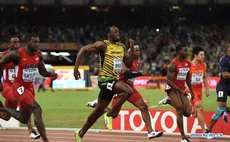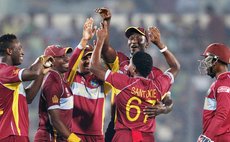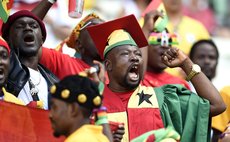Relegation for West Indies?
At last it has finally threatened as a likely reality. The stark realization that those in the seats of power are flexing their muscles to consolidate their positions of ascendancy by moving to reorganize international cricket on a two tier system. It doesn't take much brain power to gather that the big four of England, Australia, India and South Africa would constitute a sort of Premier Division while West Indies and the others would be the Second Division in Test Cricket.
It has taken long for the screws to threaten to turn. But hard considerations are just that in a world in which the grimness of economic realities do the loud talking. Herein West Indies would be forced to do the listening from a position of a weakened and marginalized entity. We are no longer a cricketing power. Our days are long gone and we are reduced to begging for a chance to subsist on crumbs disdainfully offered us as leftovers.
The latest trend in the settlement of international fixtures suggest our being doomed to be content generally with engagements against New Zealand, Pakistan, Sri Lanka, Bangladesh, and Zimbabwe. That's where we are at in our feeble impoverishment, having slid down the ladder from riches to abject rags! The question is: can West Indies come back along a road which is increasingly becoming more and more uphill?
Some pundits have made bold to say there was no thought of instituting a two tier system when West Indies were dominant on the International scene. This is a plausible point. However, can't it be argued that West Indies has done precious little to extricate itself from its parlous position?
Let's look back at a time in the not too distant past. The year was 1988, only a quarter of a century ago. A five match Test Series in England unfolded with a drawn match at Trent Bridge, Nottingham. The second at Lords, London was won by West Indies by 134 runs, the third at Old Trafford, Manchester was won by an innings and 156 runs; the fourth was won by West Indies by 10 wickets at Headingley, Leeds and the fifth was won by eight wickets to make it a 4–nil drubbing by West Indies.
The West Indies captain was Sir Vivian Richards who had at his services Gordon Greenidge, Desmond Haynes, Richie Richardson, Carl Hooper, Gus Logie and Jeffery Dujon as premiere batsmen alongside his illustrious self.
In the bowling department Malcolm Marshall, Curtly Ambrose, Courtney Walsh, Winston Benjamin and Patrick Patterson were the chief executioners– taking 85 wickets between them.
Three months later it was Australia's turn beaten 3-1 on their own soil. In just a little over a month later similar indignity was forced on India, this time in the Caribbean. The very short span of time in which such havoc was wreaked was no more than eleven months of swaggering dominance by West Indies.
Greenidge posted scores of 25; 22 and 103; 45; 10 and 77; 80 and 16; 40 and 0; 49 and 36 not out; 56 and 4; 12 and 104; 82; 117 and 6; 21 and 8 and 0 and 12.
Greenidge's partner at the top of the innings, Desmond Haynes was equally prolific: 60; 12 and 5; 54 and 25 not out; 2 and 77 not out 40 and 30 not out; 11 and 100; 17 and 23; 75 and 143; 83 and 15; 20; 27 and 117 not out; 65 and 6 and 15 and 35.
Other accredited batsmen were signally successful for West Indies. Their performances survive as museum pieces of the standing of crown jewels, leaving older cricket lovers to repeatedly ask where have the West Indies gone wrong. I have said it over and over again the problem has been with the administration of West Indies Cricket.
Speaking with former West Indies batsman and selector Irving Shillingford on Sunday last he was adamant that the cricket board has allowed their players to get away with murder. He is perplexed that things have been allowed to drag on for so long without any specific standards being applied in relation to the pay drawn by the players—reputedly among the highest paid in International cricket.
Jokingly, I suggested to Irving he is guilty of being born too early! Indeed, one couldn't see Irving Shillingford in a team which lost a match in abject fashion proceeding to entertain itself with a river or seaside picnic– as if pride never came into the reckoning!
A general assessment allows us to deduce the annual pay of an established West Indies Cricketer as about U.S. $150,000 or E.C. $400,000. If this is not sufficient to demand a commensurate amount of genuine commitment to performance within due assignments, nothing is. Any team having difficulty to perform well in two successive hours of play, or from one session to another, or from one day to the next, or from one innings to another, or from one match to the next reveals itself as totally unfit, both physically and mentally.
That the board can keep tolerating such a sad state of affairs is more lamentable. It is time the tail be stopped from wagging the dog.
Incidentally, it was pleasing to hear famed pacer Curtly Ambrose silencing his interviewer on a TV programme on the matter of issue taken to suggest that Darren Sammy's captaincy was of any critical significance in West Indies current demise. Ambrose should know a thing or two about cricketing success.
Sammy may be considered a goat at times with his batting but I prefer the assertion of one of my esteemed acquaintances that he more easily fits the bill of "escaped goat" rather than scapegoat! Without Sammy West Indies would have slumped more deeply into damnation. We wish any of our batsmen would assume the dignity of Shiv Chanderpaul's love for team and self!
(Reginald St. H Shillingford is a Sports Analyst and Commentator)




